- Joined
- Jan 28, 2011
- Messages
- 100,217















http://www.polygon.com/2014/3/18/55...al-built-from-mutual-respect-says-paradox-and
The recently-announced partnership between Paradox Interactive and Obsidian Entertainment to publish Pillars of Eternity began with mutual appreciation.
Paradox CEO Fredrik Wester already knew designer Chris Avellone, co-founder of Obsidian, after a meeting at a conference a few years prior. Obsidian head Feargus Urquhart also knew several members of Paradox's team, and through them the two companies began murmuring about a role-playing game partnership.
"I'm an old-school PC game player," Urquhart told Polygon. "The old games and the old RPGs. I've always seen the stuff Paradox has done and played the games they've made, and I've always been impressed.
"If someone asked me 10 years ago as everything was going console and publishers were getting bigger and suddenly there were less publishers: could a PC business survive in a world of big console games, where Activision has three brands? And I just didn't know," he added. "So it's awesome to see what Paradox is doing and that's what pushed us to go to them. They care about everything. A lot of times when we go to publishers we're not the big game, we're the little game off in the corner. So it's good to go to people who care."
When Urquhart and Obsidian began discussing the possibility of joining with a publisher for Pillars of Eternity, Paradox immediately came to mind. When the developers learned the company was interested, a "little dance" began between Obsidian and the RPG publishing powerhouse, as Urquhart puts it, before the two came to a mutual agreement and forged their relationship.
"I took over Paradox in 2004 when no one else wanted it because everything was going console," Wester told Polygon. "I sat with people day and night and tried to make a console project. I couldn't make a profit, it was impossible — everyone wanted to go console, we wanted to go console. But we couldn't make the money. The money just wasn't there. So we started building digital distribution direct."
Paradox began teaming up with digital PC platforms like Steam to bring downloadable games to consumers. Ten years later, Wester said, it seems like PC is steadily become a universally preferred platform with a guaranteed wide audience.
"That is awesome to see," he said. "Companies like Riot Games came out of nowhere, and not to mention Minecraft started on the PC."
Urquhart said that following the Kickstarter campaign, producer Brandon Adler was torn: he had to not only contribute to development on Pillars of Eternity but he had to think about marketing and Kickstarter backer rewards as well. He could see Adler wilting under the need to "have two brains," essentially doing two jobs at once and preventing him from focusing on the game.
"That was the pressure on our side to be open to the idea of talking to someone about marketing and distribution," he said.
Paradox will support Obsidian through publication of Pillars of Eternity as well as all the game's DLC and expansions. As for people criticizing Obsidian for partnering with a publisher after going through Kickstarter to avoid doing so, Urquhart expressed that he is bracing for this criticism and wants backers to know that no money was lost — but partnering with Paradox will allow the team to focus less on things like shipping rewards and more on making the game the absolute best it can be.
"It's very important to me that everyone understands this is a decision that we made together," he said. "Could we have done this ourselves? Yes, we could have farmed out backer fulfillment. We did not need to do this, but we think it's best for the game and ultimately for our backers."
According to Urquhart, Adler and the team are relieved they can now zero in on finishing Pillars and Paradox can take charge of the t-shirts. The team is sincere in reaffirming every dollar from backers has gone into the game and "everything we said we'd do, we'd do."
Paradox and Obsidian will remain independent companies but will continue to foster their mutual relationship. Urquhart said he feels he can "call out" Paradox if something is uncomfortable, and both company heads are confident that lines of communication will be open and strong.
"This is a partnership between two strong independent companies that remain strong and independent," Wester said. "That's the reason we're doing this. We also want to build a new genre within the RPG genre as well, and we will work long-term with Obsidian to build that new genre and grow a community."
"You can feel independent even if you're owned by someone else," he added. "We are both privately held and centered around small ownership groups, and because of that it's much easier to get along. We've eliminated a lot of the initial threats to the relationship not working. We can focus on the thing that matters, and that is the game."


























![Glory to Codexia! [2012] Codex 2012](/forums/smiles/campaign_tags/campaign_slushfund2012.png)
![Have Many Potato [2013] Codex 2013](/forums/smiles/campaign_tags/campaign_potato2013.png)



